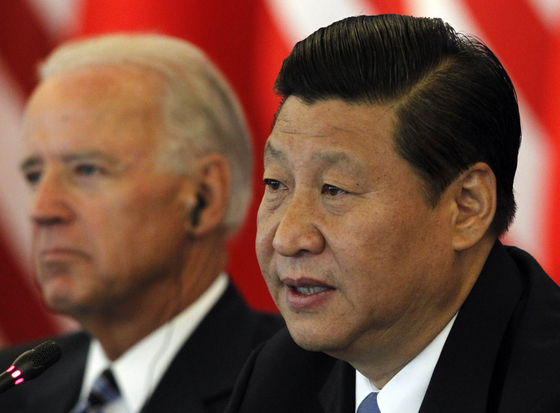![The conflict between the U.S. and China over the human rights issue of Xinjiang Uyghur is turning into a'sanctions competition'. China has stepped up all-round retaliation sanctions against the United States, the European Union, the United Kingdom, and Canada. The photo shows Vice President Joe Biden (left) and Vice President Xi Jinping when visiting Beijing, China in August 2011. [AFP=연합뉴스]](https://i0.wp.com/pds.joins.com/news/component/htmlphoto_mmdata/202103/28/90e3f73d-b8c8-42d4-860c-2efe76789722.jpg?w=560&ssl=1)
The conflict between the U.S. and China over the human rights issue of Xinjiang Uyghur is turning into a’sanctions competition’. China has stepped up all-round retaliation sanctions against the United States, the European Union, the United Kingdom, and Canada. The photo shows Vice President Joe Biden (left) and Vice President Xi Jinping when visiting Beijing, China in August 2011. [AFP=연합뉴스]
The human rights conflict between the United States and China, which began in earnest after Joe Biden’s inauguration of the US administration, is turning into a sanctions fight. When the Biden administration imposed sanctions on human rights abuses against Xinjiang Uighur ethnic minorities, China also responded with retaliatory sanctions against the United States, Canada, and the United Kingdom. China opposes the criticism on human rights as’interference in internal affairs’, but the Biden administration puts human rights and democracy at the center of its foreign policy, and the two countries are in a head-to-head conflict.
Korea’s’high-route diplomacy’ test bench
On the 22nd (local time) on the 22nd (local time), when the United States, the European Union, the United Kingdom, and Canada imposed simultaneous sanctions against individuals and organizations in Xinjiang for human rights violations in Xinjiang, China immediately took action to retaliate. Starting with sanctions against the EU on the day of the announcement of the sanctions, the United States and Canada on the 25th and the UK on the next day were subject to sanctions. In particular, against the United Kingdom, even House Foreign Affairs Chair Tom Tugentad was subject to sanctions, freezing assets in China and banning entry into the country.
In a statement from a spokesperson on the 27th, the justification for the sanctions against Buddha was that “it imposed sanctions against China in relation to the kidney problem with lies and false information.” They acknowledged that the United States, the European Union, the United Kingdom, and Canada have imposed all-round sanctions as a retaliatory measure for sanctioning Chinese officials and organizations for human rights abuses.
After the US, the EU, the UK, and Canada, to the’quad’?
![Joe Biden's US administration is strengthening solidarity with its allies around human rights issues. On the 22nd, a representative case was imposed sanctions against China in relation to the kidney problem in cooperation with the European Union and others. [연합뉴스]](https://i0.wp.com/pds.joins.com/news/component/htmlphoto_mmdata/202103/28/01e6951e-62fb-40d5-85b2-1a90e35a27f3.jpg?w=560&ssl=1)
Joe Biden’s US administration is strengthening solidarity with its allies around human rights issues. On the 22nd, a representative case was imposed sanctions against China in relation to the kidney problem in cooperation with the European Union and others. [연합뉴스]
On the list of sanctions in China, Gain Manchin and Vice-Chairman Tony Perkins of the United States International Religious Freedom Commission (USCIRF), Michael General Assemblyman of Ontario, Canada, and the International Subcommittee on Human Rights in the Canadian Parliament were on the list.
China has begun to refer to the Quad (US, Japan, Australia, India) security council as the next target for sanctions. China’s state-run Global Times said in an interview with Professor Zhou Ying of Sinan Jeong Law University on the 28th, “It will be the next quad of the United States, Japan, Australia, and India (which China imposes sanctions). They will be with us, and there may be joint sanctions.” It is a threat that China will expand the scope of retaliation to the quad participants for the US rallying the alliance to criticize China’s human rights issue.
Difficulty in’sanctions competition’ between the US and China Korea
![The prospect was raised that China's next target for sanctions would be a'quad', which is evaluated as a security consultative body for Chinese checks. The photo shows U.S. President Joe Biden's participation in the quad summit held on video on the 12th (local time). From the left of the screen, Japanese Prime Minister Suga Yoshihide, Indian Prime Minister Narendra Modi, and Australian Prime Minister Scott Morrison. [AFP=연합뉴스]](https://i0.wp.com/pds.joins.com/news/component/htmlphoto_mmdata/202103/28/e9f10ada-490d-443f-b115-f649255153dc.jpg?w=560&ssl=1)
The prospect was raised that China’s next target for sanctions would be a’quad’, which is evaluated as a security consultative body for Chinese checks. The photo shows U.S. President Joe Biden’s participation in the quad summit held on video on the 12th (local time). From the left of the screen, Japanese Prime Minister Suga Yoshihide, Indian Prime Minister Narendra Modi, and Australian Prime Minister Scott Morrison. [AFP=연합뉴스]
As the US-China conflict over human rights issues intensifies, South Korea’s’close-rope diplomacy’ is also on the test. Although the issue of human rights, which is the universal value of humanity, cannot be ignored, the criticism of the kidney issue is likely to cause deterioration in relations with China. In particular, as Foreign Minister Eui-yong Eui-yong is coordinating the schedule of his visit to China this week as early as this week, the Korean government’s grievances are deepening.
Reporter Jeong Jin-woo [email protected]
![]()
